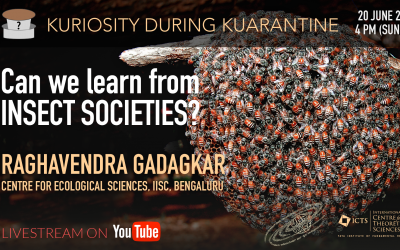Abstract:-
Many insects such as ants, bees, wasps and termites organise themselves into societies with division of labour, communication, conflict, cooperation and altruism. Insect societies resemble human societies in many ways and are arguably more efficient than ours in some ways. They sustainably harvest environmental resources, engineer their environments both inside and outside their nests, practice agriculture, fight disease with a combination of individual and social immunity, organise social hunting parties, navigate their environment using terrestrial and celestial cues and majorly influence the evolutionary trajectories of other organisms such as flowering plants. So, can we humans learn anything from insect societies? In this talk I will attempt to answer this question in the affirmative, but with caution. I will consider such relatively non- controversial topics as communication, agriculture and robotics but also some relatively controversial topics such as cooperation, conflict, collective decision making and democracy.
About the Speaker:-
Raghavendra Gadagkar, Ph.D. (Indian Institute of Science, Bangalore, 1979), studies Animal Behaviour, Ecology and Evolution and is especially interested in the origin and evolution of social life in animals. Gadagkar is now DST Year of Science Chair Professor at the Centre for Ecological Sciences, Indian Institute of Science and Non-Resident Permanent Fellow of the Wissenschaftskolleg zu Berlin. He has published over 350 research papers, articles and three books, Survival Strategies (Harvard University Press, 1997), The Social Biology of Ropalidia (Harvard University Press, 2001) and How to Design Experiments in Animal Behaviour (Open-access e-book, Indian Academy of Sciences, 2021). He has been recognized by several awards including the Shanthi Swarup Bhatnagar Prize, the Third World Academy of Sciences award in Biology and the Cross of the Order of Merit of the Federal Republic of Germany. He is a fellow of the Indian Academy of Sciences, the Indian National Science Academy, the National Academy of Sciences, India, The World Academy of Sciences, Leopoldina, The German National Science Academy, International Member, National Academy of sciences, USA and Foreign Honorary Member, American Academy of Arts and Sciences. He has served as a member of several committees including the Scientific Advisory Committee to the Cabinet, Government of India.




